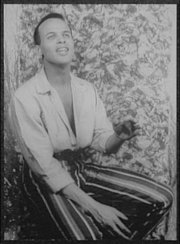Harry Belafonte
|
|

Tv_muppet_show_harry_belafonte.jpg
Harry Belafonte (born Harold George Belafonte on March 1, 1927 in Harlem, New York, United States, is a Jamaican-American calypso musician and actor who used his fame as an entertainer in the cause of human rights.
He is perhaps best known for singing the "Banana Boat Song" with its signature lyric "Day-O". His breakthrough album Calypso (1956) was the first album to sell over 1 million copies. He was the first African-American to win an Emmy, with his first solo TV special “tonight with Belafonte”.
He appeared on The Smothers Brothers Comedy Hour and performed a controversial "Mardi Gras" number with footage intercut from the 1968 Democratic National Convention riots. Belafonte has gained notoriety for his left wing political views. He appeared on a Democracy Now! show where he quoted the civil era icon Malcolm X:
- "There was two kinds of slaves. There was the house Negro and the field Negro. The house Negroes, they lived in the house with master, they dressed pretty good, they ate good 'cause they ate his food and what he left. They lived in the attic or the basement, but still they lived near the master; and they loved their master more than the master loved himself. They would give their life to save the master's house quicker than the master would. The house Negro, if the master said, 'We got a good house here,' the house Negro would say, 'Yeah, we got a good house here.' Whenever the master said 'we,' he said 'we.' That's how you can tell a house Negro. If the master's house caught on fire, the house Negro would fight harder to put the blaze out than the master would. If the master got sick, the house Negro would say, 'What's the matter, boss, we sick?' We sick! He identified himself with his master more than his master identified with himself. And if you came to the house Negro and said, 'Let's run away, let's escape, let's separate,' the house Negro would look at you and say, 'Man, you crazy. What you mean, separate? Where is there a better house than this? Where can I wear better clothes than this? Where can I eat better food than this?' That was that house Negro. In those days he was called a 'house nigger.' And that's what we call him today, because we've still got some house niggers running around here.
Belafonte used that quote to characterise both former and current United States Secretary of State Colin Powell and Condoleezza Rice as "house slaves" for their behaviour and refusal to stand up against the decision of President George W. Bush to go to war with Iraq according to his War on terrorism plan.
He is sometimes also blamed for maintaining an image of a man who rose to fame without forgetting his roots and in the process "spoofing" or exaggarating his connection wih the soil as a part of showmanship.
From 1935 to 1939 he lived with his mother in her homeland Jamaica. When he returned to New York he attended George Washington High school after which he joined the navy and served during the second world war. At the end of the 1940s he took classes in acting and subsequently received a Tony Award for his participation in John Murray Anderson's Almanac.
In 1968, Belafonte appeared on a Petula Clark primetime special on NBC. In the middle of a song, Clark smiled and briefly touched Belafonte's arm, which made the show's sponsor, Plymouth Motors, nervous. They wanted to cut out the segment but Clark, who had ownership of the special, told NBC that the song aired intact or she wouldn't allow her special to be aired at all. Plymouth's demands made the national newspapers and when the special aired, it grabbed high viewing figures. Clark's gesture marked the first time in which two people of different races made friendly bodily contact on US television.
He has won a Grammy Award in 1985 for lifetime achievement and has been made a UNICEF goodwill ambassador.
His daughter, Shari Belafonte, is a photographer, model and actress.
Quote
- "I work for the United Nations. I go to places where enormous upheaval and pain and anguish exist. And a lot of it exists based upon American policy. Whom we support, whom we support as heads of state, what countries we've helped to overthrow, what leaders we've helped to diminish because they did not fit the mold we think they should fit, no matter how ill advised that thought may be." - Harry Belafonte interview on CNN Larry King Live, October 15, 2002
Filmography
- Bright Road (1953)
- Carmen Jones (1954)
- The Heart of Show Business (1957) (short subject)
- Island in the Sun (1957)
- The World, the Flesh and the Devil (1959) (also producer)
- Odds Against Tomorrow (1959)
- King: A Filmed Record... Montgomery to Memphis (1970) (documentary) (narrator)
- The Angel Levine (1970) (also producer)
- Buck and the Preacher (1972) (also producer)
- Uptown Saturday Night (1974)
- Sometimes I Watch My Life (1982) (documentary)
- Say No (1983) (documentary)
- Three Songs (1983) (short subject)
- We Shall Overcome (1989) (documentary) (narrator)
- The Player (1992) (Cameo)
- Ready to Wear (1994) (Cameo)
- Hank Aaron: Chasing the Dream (1995) (documentary)
- White Man's Burden (1995)
- Jazz '34 (1996) (documentary)
- Kansas City (1996)
- Scandalize My Name: Stories from the Blacklist (1998) (documentary)
- Fidel (2001) (documentary)
- XXI Century (2003) (documentary)
External links
- Harry Belafonte - a site of sites (http://www.belafonte-asiteofsites.com/)
- 2004 Global Exchange Human Rights Award (http://www.democracynow.org/article.pl?sid=04/06/15/1410245) - Belafonte's acceptance speech in San Francisco
Template:Commonsde:Harry Belafonte fr:Harry Belafonte nl:Harry Belafonte sv:Harry Belafonte
